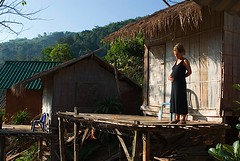
Akha Hill House
The view from grew increasingly wild as Tao our driver wound the pick-up truck out of Chiang Rai, first skirting along the side of the surging Mae Kok River then climbing up a steep dirt road deep into the hills. Our destination was a tiny Akha hill village perched on the side of a hill 25km west of Chiang Rai. Here one of the villagers has managed a small guesthouse for 18 years. The Akha Hill House was the brainchild of Mr Apae; a way of bringing some much-needed income to an area that had traditionally earned a living growing opium poppies. The guesthouse was founded as a homestay at the same time that the Thai government was creating projects to substitute opium with other crops, such as tea and lychees. The business has flourished ever since, attracting backpackers, families and more affluent tourists from Thailand as well as abroad. It really is a guesthouse these days. If you arrive expecting to live and stay with a family, learning about their daily lives, then you will be disappointed. On the other hand, if you are looking for a peaceful mountain retreat that is the sole business of one Akha family and helps to cascade income to neighbouring families then the Hill House is unlikely to let you down.
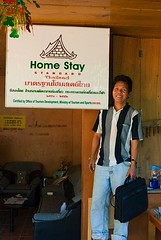
A very happy Mr Apae
The road culminates in a series of tight bends through bamboo forests before threading its way past an oolong tea plantation where rows of dark-green low bushes march uphill in regular file. Delicate flowers the colour of fried eggs brighten the dark lustre of the leaves which are destined to be dried and exported to the tea-drinking markets of the world. A bamboo sign across the road proclaims our arrival at the Akha Hill House. To either side are slopes that descend down to narrow, forested gullies cut by mountain streams, the rush of water over boulders creating a musical score to the view back down the road we have come along. Bamboo, bananas, lychee bushes and natural forest shroud hills crowding in to either side of a long valley. A range of mountains forms the distant backdrop.

The view from our room with a view
Elevated bamboo and mud-brick bungalows, each with a terrace out front, are carefully placed to make the most of this tropical mountain view. You could picture the pandas chewing on young bamboo shoots, except this isn’t China and at only 1,500 metres above sea level it is probably too low for China’s iconic animal to bother itself with. As we discovered the next morning, the bungalows are also perfectly located to allow each guest to catch sunrise right from their bed if they are prepared to open the door. The more enthusiastic early risers can turn the mountain valley into the ideal foreground for stunning sunrise photographs.

Johun, an apprentice at Akha Hill House concentrates on his English
The guesthouse offers a free pick-up ride from Chiang Rai which arrives at about 5.30pm, so before the delights of sunrise there is the evening fire to enjoy. Guests and staff, foreign, Thai and Akha, gather around the fire to warm themselves against the freshening night chill and swap stories. Mr Apae employs a number of apprentices who are setting up their own homestays in other Akha villages and he encourages them to both improve their own English and teach some Thai with the foreign guests. We were soon learning about Akha culture and the attractions of the surrounding region as well as the Thai words for fire and wood. The apprentices also learn about community tourism through practical experience that includes leading tours and managing the restaurant. Johun is an enthusiastic 24 year-old plant sciences graduate who leads all-day walks where he describes agricultural and jungle plants. Later in 2009 he plans to open a small homestay in his village close to the Myanmar border and is currently working out how to create a website. It looks like he is keen to model himself on Mr Apae’s success.
The guesthouse offers a menu of typical Thai dishes sprinkled with a few Akha specialities such as banana tree soup and chilli paste in which to dip boiled vegetables. Staff and most guests make their way to bed by 10.00pm and then you are left to enjoy the chorus of the night sung by crickets, cicadas and frogs under the stars and moon.
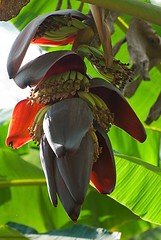
A banana flower creates its fruit
Mr Apae provides a range of treks and activities, none of which are pushed or promoted to you while staying at the guesthouse. Should you wish to find out more, all you need to do is ask Mr Apae who will sit with you and go through what he has on offer. Most guests do one of two treks. One is a walk into the jungle to learn about jungle and local crops, try your hand at fishing in a stream, cook lunch in bamboo and visit a nearby waterfall that contains an impressive force of water even in the dry season. Another trip to an elephant camp, oolong tea plantation and hot springs can be done by a combination of foot, car and long-tail boat.
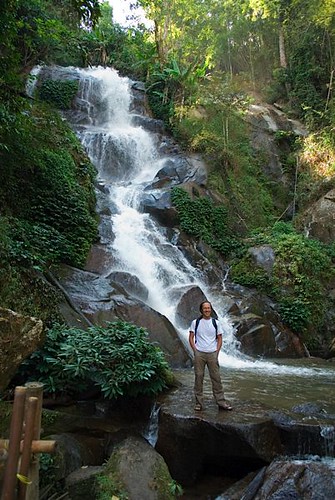
Strolling to the waterfall, just a 15 minute walk from the guesthouse
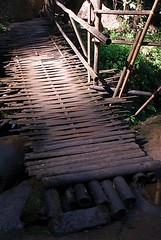
The way to the waterfall

Some guests do what we did, hang out on their terrace and wander around the local area. Over three days we slowly made our own way to the waterfall, tea plantation and hot springs, none of which were more than 5km away and all were accessible along well-maintained paths. We walked through forests of tall trees, stands of bamboo as well as plantations of bananas and lychee trees. On the way we wandered through the village, browsing handicraft shops set up by enterprising families and encouraged by Mr Apae, and a nearby Chinese village populated by descendents of the remnants of Chiang Kai-Shek’s Nationalists who fled China when the Communists took control in 1949. Here we found a small roadside vegetarian café selling som tam, the ubiquitous Thai green papaya salad, and noodles with mushrooms and tofu. The owner was keen to teach us the Thai words for ingredients and different varieties of chilli condiments but I’m afraid we seem to have ultimately failed to pass our exams.
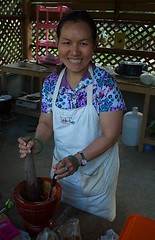
Making som tam

Oolong tea plantation
We bumped into one group retuning from a tour and were invited to share oolong tea and cherry wine with them. Another day, a Sunday, while looking for the village shop, which was closed, we were invited to sample the local vodka by a friend of the shop owner as they drank away the afternoon. I also spent a relaxing hour or so in the guesthouse sauna during our last evening, warming myself to steam infused with blood vine, a very medicinal smelling local herb, which is pumped into a small bamboo and mud-brick hot room. Afterwards I enjoyed the subtle flavour of banana tree and coconut soup while frogs proclaimed their territories or sexual prowess in the gully below.

Pouring the local oolong
We spent three days, four nights at the Akha Hill House in a 350 baht bungalow with en-suite hot water shower and toilet. Rooms with shared bathrooms in the main building are available for 200 baht but you don’t get the stunning views. Bungalows go progressively upmarket to 1,500 baht VIP set-ups which come with TV, a strange necessity in such a tranquil setting. The free pick-up leaves Chiang Rai bus station at 4.30pm each day and can collect you from your hotel. It returns to Chiang Rai at 9.30am where Tao spends the day meeting foreigners arriving in the city by bus. A more delightful tout you couldn’t hope to meet. You can also get to the guest house along the river from either Chiang Rai or Chiang Mai. The boat pier is 5km from the guesthouse at the bottom of the steep dirt road but if you ring ahead they will collect you.
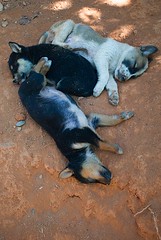
And the local puppies didn't wake up for much



No comments:
Post a Comment